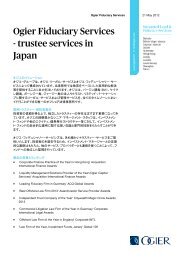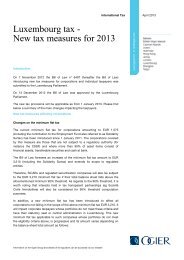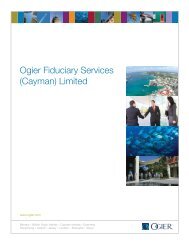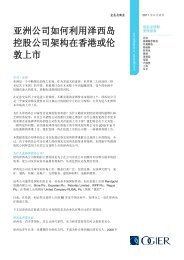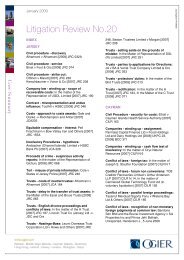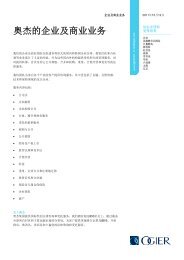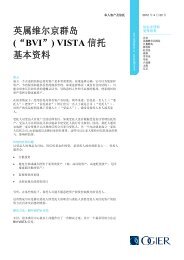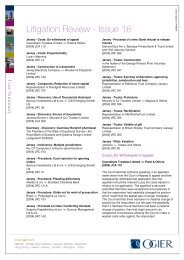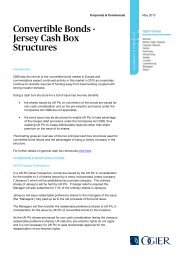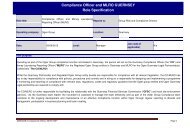Litigation Review - No. 19 - Ogier
Litigation Review - No. 19 - Ogier
Litigation Review - No. 19 - Ogier
You also want an ePaper? Increase the reach of your titles
YUMPU automatically turns print PDFs into web optimized ePapers that Google loves.
April 2008<strong>Litigation</strong> <strong>Review</strong> - <strong>No</strong>. <strong>19</strong>Case SummaryIt is hoped that the new rules will be welcomed byconsumers of the Guernsey legal process and will enablethe court to deal with cases justly.Peremption - Applicable prescription periodfor an action - Building disputeSingleton v Duncan, Royal Court, 24 April2007In this case a doctrine peculiar to Guernsey law was thefocus of attention; the doctrine of ‘peremption’. What is‘peremption’? It is essentially a procedural bar to thecontinuance of a legal process which arises automaticallywhere no action has been taken in that process for aperiod of one year and a day.The claim in this case related to a building dispute valuedat just under £7,000 and which originated in <strong>19</strong>96.Peremption occurred (the action became ‘périmée’) on 30September 2004. At that time there were discussionsabout the possibility of mediation. These discussionswere not fruitful so the plaintiff applied on 17 <strong>No</strong>vember2006 for a trial date to be fixed. The defendant took thepoint that the action had become périmée.The Court noted that there are generally 5 factors to betaken into account:• the position of the plaintiff;• the history of the action which has led to its becomingpérimée ;• the position of the defendant;• any other special circumstances; and• the general circumstances in Guernsey relating to therelevant class of litigation.It was emphasized that this was not an exhaustive listand that when considering an action which had becomepérimée there was always room to accommodate thefacts of a particular case. In this case the application torestore the case to the court list succeeded, the Courtfinding that there were special considerations in this case.These included notably that discussions had beencontinuing about the possibility of mediation at the time ofand indeed subsequent to the action becoming périmée.Procedure: judge making factual findingsalone; JurisdictionFidelity Management Limited v Royal Bankof Canada (Channel Islands) Limited, RoyalCourt, 20 September 2007This case arose out of a suspicious transaction report tothe Financial Intelligence Service in Guernsey (“FIS”).The Court was asked to decide as a preliminary matterwhether or not payment instructions were validly made.There was a suggestion that the issue should be referredto the courts of the Turks and Caicos Islands as a moreappropriate forum but the Court noted that all partiesbefore the Court were content for the Court to exercisejurisdiction and accordingly the Court considered that itwas able to proceed to a determination.Having done so, the Court then required to consider thecircumstances in which a Guernsey judge can makefindings of fact in relation to preliminary issues, in theabsence of jurats (the body of professional jurors whodecide questions of fact). The Court decided that it wasdifficult to establish any settled practice on this point andtherefore declined to list all circumstances in which itwould be appropriate for a judge to sit alone to determinepreliminary issues. However, the Court did indicate that itwould be appropriate where there were no conflicts ofinterest and no questions of credibility to be considered.On the facts the declaration sought was granted and theFIS is now expected to indicate whether it will issue orrefuse consent to the instructed transfer.Utility Regulation - 3G Licence - Jurisdictionof the Utility Appeals TribunalCable and Wireless Guernsey Ltd v DirectorGeneral of Office of Utility Regulation,Royal Court, 24 May 2007In this case a restrictive analysis of the jurisdiction of theUtility Appeals Tribunal (“UAT”) in Guernsey was adoptedby the Royal Court. Cable and Wireless GuernseyLimited (“CWG”) had submitted a bid to the Office ofUtility Regulation in Guernsey (the “OUR”) seeking thegrant of a 3G licence to operate 3G services in Guernsey.The application was unsuccessful and CWG appealedagainst the OUR’s decision to the UAT. The time limit forfiling all necessary appeal documents under the relevantprimary legislation was tight (and indeed the time limitwas subsequently extended by amending legislation inrecognition of this) and CWG sought an extension of timefrom the UAT.The Royal Court ruled that under the primary legislationthe UAT did not have the power to extend the time limit.The result of this decision was that the appeal was anullity from the outset because the appeal process onlykicked off when an appeal was filed which met the criteriaset out in the primary legislation. Although the rules ofprocedure of the UAT indicated that the UAT could largelydetermine its own procedure, as secondary legislationthese rules could not be used to override time limits setout in the primary legislation.Furthermore, when the extension of time was granted theUAT had not technically come into existence as nomembers had been appointed. It followed that anypurported exercise of the UAT’s powers was null andvoid.ADMIN-14369297-2



